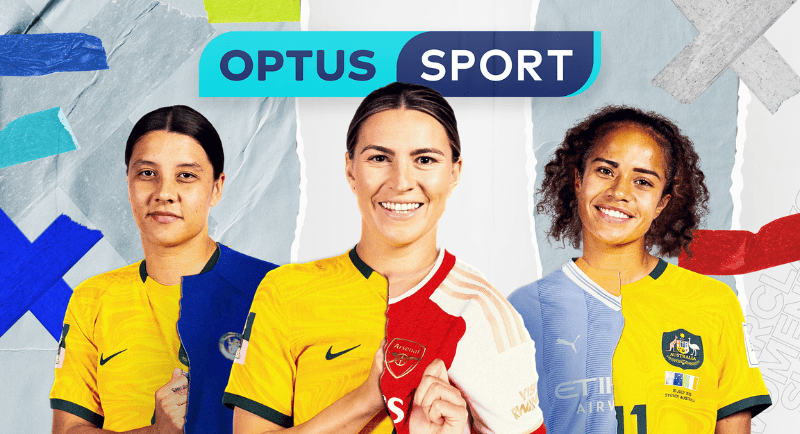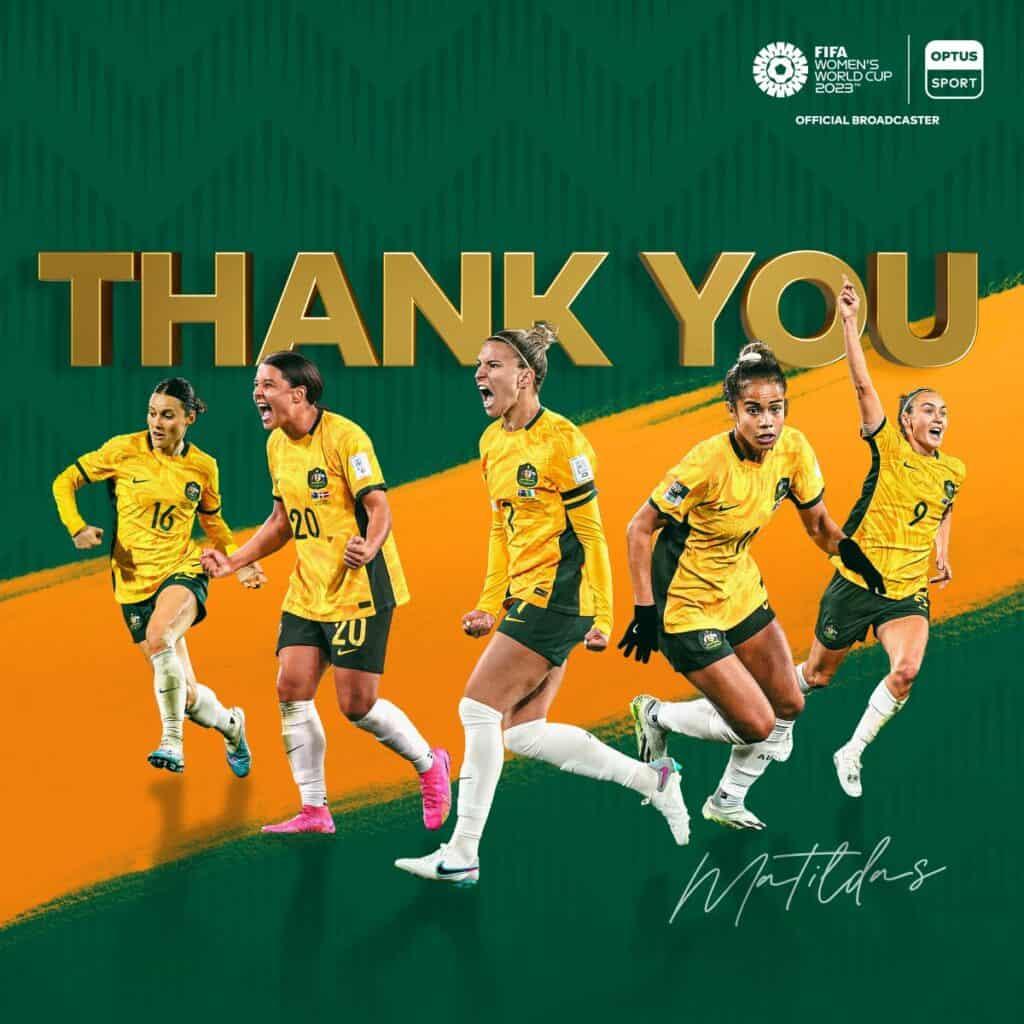
Clive Dickens
Optus Sport this month finished broadcasting one of the most-watched events ever on Australian TV. Did the telco’s partnership with Seven shake up the streaming platform’s business model? What was the impact on subscriptions and did it make Optus think it needed more sport?
Optus vice president television, content and product development Clive Dickens explained to Mediaweek the impact of the FIFA Women’s World Cup and what is next. He also explained just why we don’t know how many people were watching the Matildas.
Optus Sport business model
While giving Optus customers a discounted sports TV package is an important marketing tool, Clive Dickens noted the streaming TV service now pays its way. The division has its own P&L is no longer being offered for free.
“Subscribers now are paying and you pay $24.99 monthly if you don’t have a service from Optus,” detailed Dickens. “There is a 74% discount down to $6.99 if they are an Optus home or mobile customer. That means that all of the account holders are now paying. In the first five years, it was nearly all free.
“The first five years was very much around differentiation, acquisition, and marketing and the last three to four years were still around differentiation and service quality. It’s now also about charging the retail recommended price and then actually saying that you get a massive discount if you bring your services to Optus.”
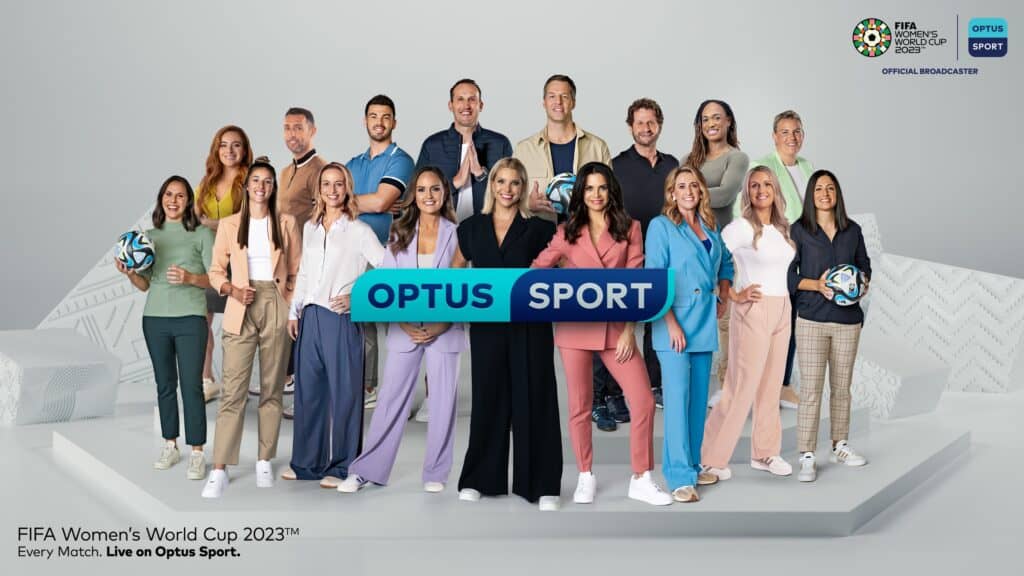
Securing the FIFA Women’s World Cup
Dickens continued talking about how Optus Sport helped spread Matilda’s fever. “The broadcast rights were acquired three years ago, just after Football Federation Australia (FFA) was successful in winning the hosting rights.”
Dickens noted Optus chief executive Kelly Bayer Rosmarin was on the board of the FFA during the period when they were pulling together their pitch to host the Women’s World Cup. She wasn’t on the board when the decision was made. She was a board member who contributed to the strategy to try and convince FIFA to let Australia be a host nation.
When Bayer Rosmarin joined the telco in 2019, Optus Sport had already sublicensed the Women’s World Cup from SBS live from France in 2019, its first investment in women’s football.
Dickens joined around that time too. “We have been the home of football and rather than going to other sports we very much believe that the growth in women’s football was something that we could help stimulate over the subsequent four years. We secured the women’s Super League after the World Cup which we have now had for three years.”
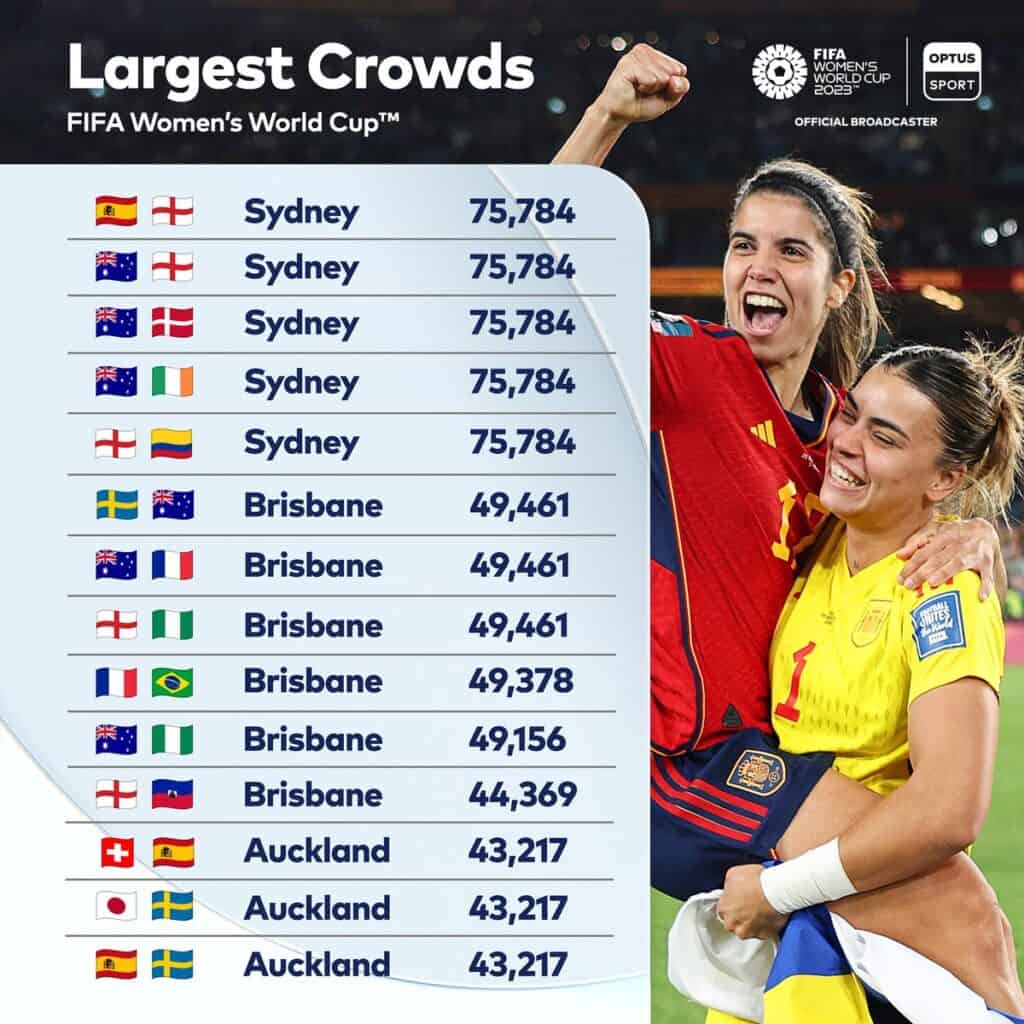
Why Optus Sport won’t reveal audience numbers
The platform doesn’t need to give competitors an insight into how much revenue it might be generating. Dickens explained: “It’s commercially sensitive information, particularly when there’s a new set of rights in the market for the future. Netflix can’t tell you how many people watch Stranger Things. Disney don’t tell you how many people watch The Mandalorian.
“What we have released, and we released it pretty much every week on a Friday, is that three of the top five days ever, or out of 6,000 games that we’ve streamed, men and women’s in the last six years, three of the top five are now Women’s World Cup games.
Why are they not the top three? Because the number one and number two were games that were exclusive to Optus Sport – England v Italy final and England v Denmark semi-final from the men’s UEFA European Championship in 2021.
“Also, the fact that 40% of all games in this Women’s World Cup were free to all was more than [the previous WWC] in 2019. Sixteen games were on Seven and reached historic world class numbers, but that didn’t stop us achieving three of the top five.
“We also did share a couple of other interesting stats. A typical paying Optus Sport subscriber on average watched over 21 hours of live football in the month which is incredible. That means on average, our paying subscribers were watching nine to 10 games, which is incredible.”
See also: Matildas World Cup TV ratings – Matildas v England clash sets new Seven and Optus Sport records
Dickens shared some other stats with Mediaweek:
• Optus Sport also had huge audiences at the WWC for matches involving USA, England, Spain and Colombia.
• Over 75% of all Optus Sport streaming was on a large-screen TV, not on a mobile.
• Less than 10% was streamed on a pocket mobile with the other viewing on laptops, iPads and tablets and other large-screen devices.
• The time zone and the Matildas attracted a younger and bigger female audience than Optus Sports gets for its Premier League coverage.
• There was huge off-network engagement, with over 100 million social video views in Australia alone, six million article reads, six million page views of Optus Sport content articles.
* Optus had about 200 people in the company working on the event making it an enormous production and a massive investment.
See also: Seven’s best buy Women’s World Cup rights: James Warburton’s bargain Matildas score
Keeping new subscribers
Dickens confirmed Optus Sport attracted many new subscribers. “I can’t tell you how much, but significantly beyond our expectations.
“Our job now is to hold those incremental subscribers. We don’t expect them all of a sudden to start supporting Arsenal men’s or Liverpool men’s. We would like to think they would support the Women’s Super League.”
Optus Sport: Super League is next
Dickens said the platform was already seeing good support for the Women’s Super League competition in the UK. The new season starts October 1. “The growth of that league in this country is over 70%. And now off the back of an incredible Matilda’s performance, we’re going to grow at 70% again.
“Then next year, in eight months, is the Euro 2024 championships from Germany, which is the men’s tournament. That’s all exclusive to Optus Sport, with some games that will be free to view.
“We’re now in the tender period for the new World Cup (men’s and women’s) rights for 2026/27 and 2030/31. “It will be a fascinating couple of months as FIFA decide who their partner is over the next four to eight years.
“It’s really important because 10 of our amazing Matilda’s play in the women’s Super League from the first of October in England. That will help us be able to hold our subscribers that we captured in the World Cup. Every week in the Super League, for example, Sam Kerr plays for Chelsea and scores goals every Saturday.”
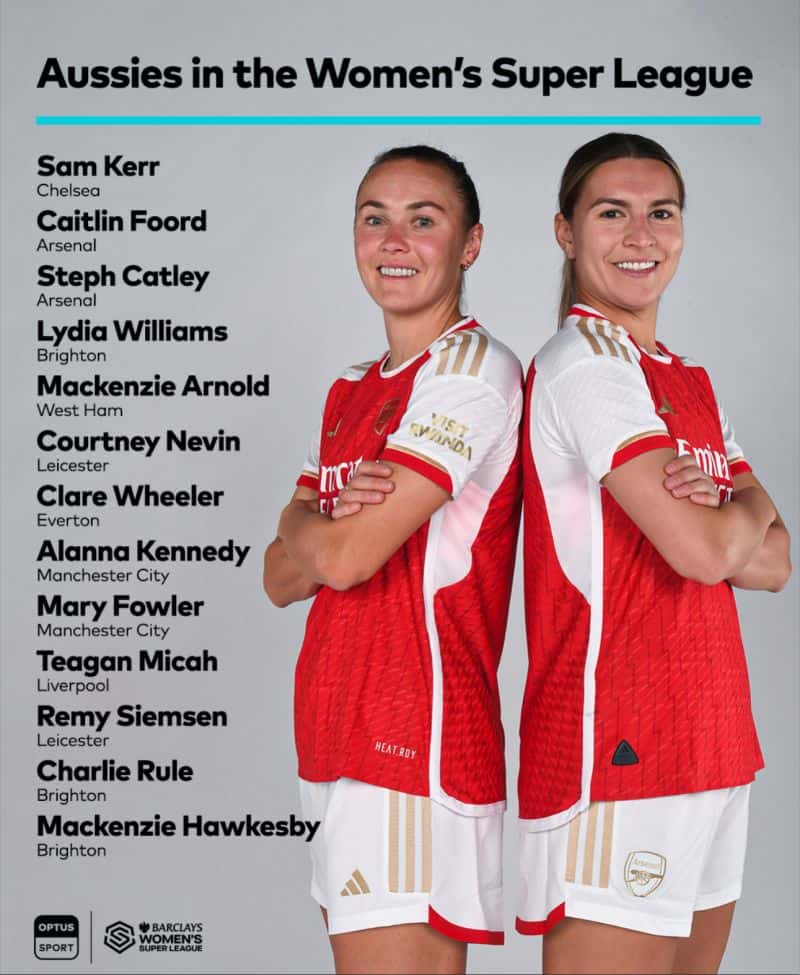
The not-so-secret success to securing rights
“It always comes down to money,” said Dickens when asked how important relationships are in rights negotiations. He noted that having a focus on just one sport makes it easier for Optus Sport when it comes to marketing. “It’s like having a favourite child. If you only have one child, you only have your favourite child. We only have one child, it’s called football. If we had another sport, we wouldn’t have a favourite child anymore. It’s very hard to give that second, third or 10th sport prominence on your platform. You also then have some customers paying for things that they never watch. Because we only have football, it means that there is much less wastage for the customer and better value. it means that we can channel our marketing.
“Unfortunately it makes no difference to the rights conversation. All of the rights bodies just want money to raise the investment in women’s football so they can pay these amazing athletes the same as they pay men.
“We invested enormously in this tournament. Kelly Bayer Rosmarin and I were happy to do that because we knew the event needed investment. If we all want women athletes to be paid the same as men, then we’re going to pay, we’re going to watch adverts, we’ve got to buy tickets, somebody’s got to buy subscriptions – free does not pay people’s salaries.”
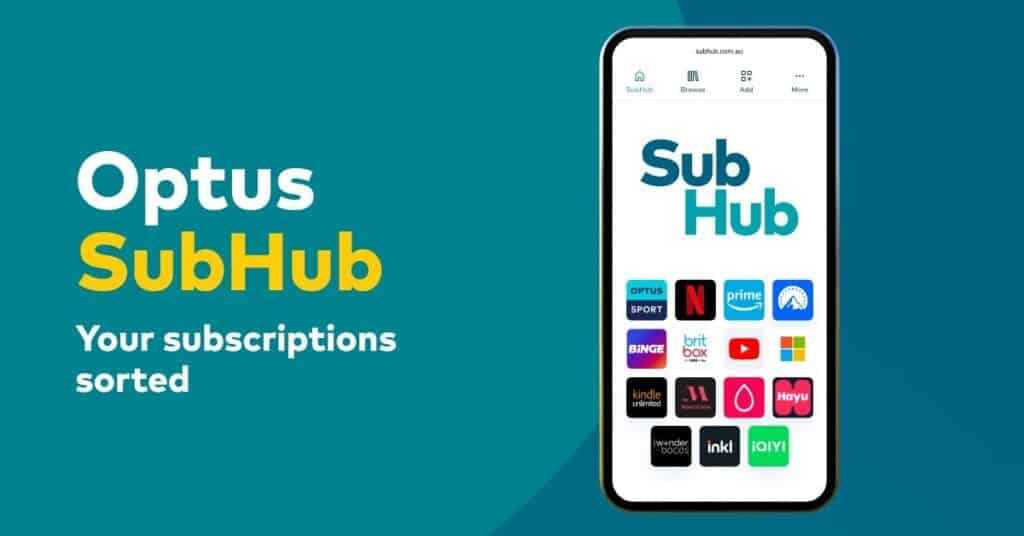
Keeping customers locked in
Optus Sport does have another income stream though, via the aggregation it offers with its SubHub product. “That allows us to give other services to our customers,” said Dickens.
“We discount Netflix, Prime Video, and Paramount+. Rather than commission other sports or other content, we give Optus customers discounted access to all those services. It’s cheaper to buy Netflix from Optus than from anywhere else in Australia. It’s cheaper to buy Prime Video from us and it’s cheaper to buy Paramount+ from us.
“Rather than getting into the very expensive content acquisition world we have a marketplace of apps set up that allows customers to pick and choose what they want, and they can easily pause their subscription. Some people who stopped Optus Sport after the Women’s World Cup [after the final] swapped their subscription to another one of our services.
“We have 27 subscription services on SubHub. We are the first in the world to do it and are exporting it to other markets. We’ve got most of the main services already and the ones that are missing will be on soon. When other services talk about aggregation, they talk about bringing it all into one interface. I don’t think consumers want it on one interface. It’s not hard to navigate your Apple TV or your Fire Stick or your Google TV.
“What consumers want is something that’s affordable. They know how to open the apps, they know how to find the content. They can’t afford to subscribe to all the services at the same time. They want something that makes it sustainable for them as households.”
One sport is enough…for now
Dickens: “In terms of other sports, we never say never, we’re always looking. But it would need to be something special. Seven years ago, when we first acquired Premier League, it was it was slightly hidden inside another platform [Fox Sports], and it didn’t have the emphasis or the marketing.
“The same with women’s football. When we first started streaming women’s football in 2019 not many people were watching women playing football.
“If we’re going to do something beyond football would have to be as inventive and disruptive and innovative as the original Premier League acquisition.”
World Cup rights history
SBS secured World Cup rights in 2011 all the way until 2022. SBS sub-licensed the World Cup rights to Optus in 2018/19. “You might remember that in 2018 it was not Optus Sport’s finest hour,” said Dickens referring to the streaming problems that plagued the broadcasts.
In 2019 Optus Sport sublicensed the world’s Women’s World Cup subscription rights from SBS.
SBS held onto all rights for the 2022 Qatar World Cup, the last tournament in that SBS rights cycle.
The rights to the 2023 Women’s World Cup was a one-off rights event because Australia was a host nation.
Dickens said Optus Sport had been looking at the next rights bundle but had not publicly revealed if it would be a bidder.
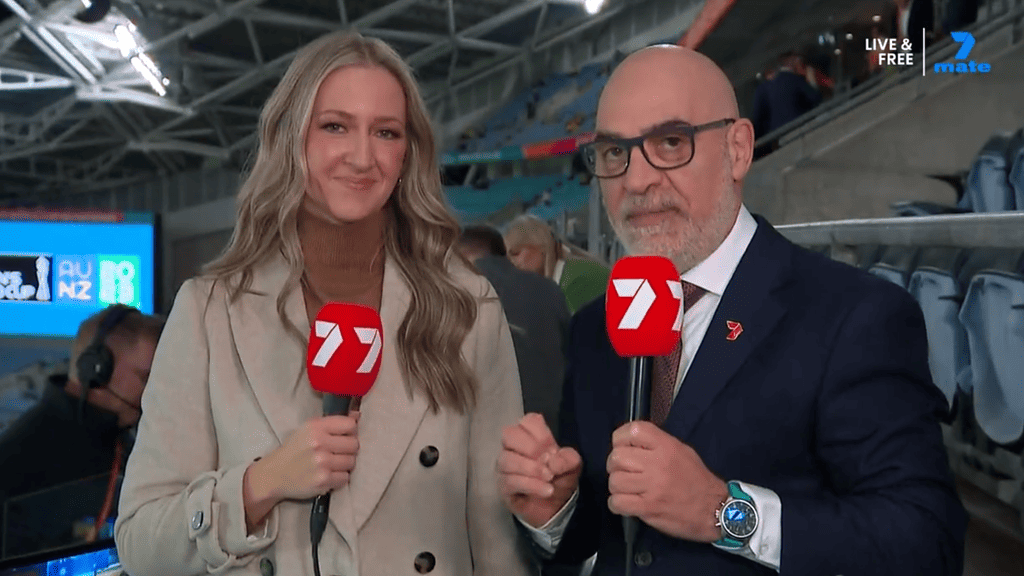
Grace Gill and David Basheer at FIFA Women’s World Cup for Seven
Optus Sport partnership with Seven
Dickens noted his previous employer Seven was one of the companies that initially wanted to share Women’s World Cup matches. “We ran a sublicense free-to-air tender. Four of the five FTA broadcasters bid for those free to view games free to our games. It was a very competitive tender. It went to the second round, and Seven won the bid in the second round.
“My relationship with Seven was only useful after they won the rights. I was pleased that they valued the rights higher than anybody else. They did an exceptional job once they secured the rights in an independent tender. It meant that my team and their team had strong relationships to try and maximise the commercial opportunity.
“The thing we’re most proud of is that we created 10 unique brand partnerships that were exclusive to Optus Sport and Seven. Whether you were watching the game on Seven or Optus Sport, you saw the same brand partners. Whether that was Cadbury or Qantas or McDonald’s.
“All of the 10 partners were part of a joint sales policy, which means that it simplified the buying process for agencies and clients. It avoided any unnecessary channel conflict around negotiating where the ads would run. Just as importantly, it has generated a phenomenal return on investment for the brands. Because whether you are watching clips or games, on Optus Sport, or Seven, there was strong recall of those brands.
“The brands themselves were the ones that won the most because the audience was way higher than all our expectations. Those brands therefore benefited from that halo impact of the feelgood factor and the larger audiences. The fact that we have worked together previously with Seven did make the commercialisation of the whole tournament a lot more straightforward which was something we’re very proud of.”
Why do Optus Sport subscribers get ads?
Sports rights are extremely valuable and that’s a code word for extremely expensive,” said Dickens by way of an answer. “The only way we can sustain the investment in women’s sport and men’s sport with no ads will be to put the price up even higher. The advertising subsidises the price down to a more affordable $24.99. If you become an Optus customer where you can get the fastest 5G and 25% cheaper than Telstra, then you can get Optus Sport for $6.99.”
Dickens noted that Fox Sports has long shown ads, and advertising is now mushrooming across other subscription streaming platforms.
“That is the only way the digital economy will be sustainable over the next 10 years. Subscription and advertising together is the only sustainable route forward.”
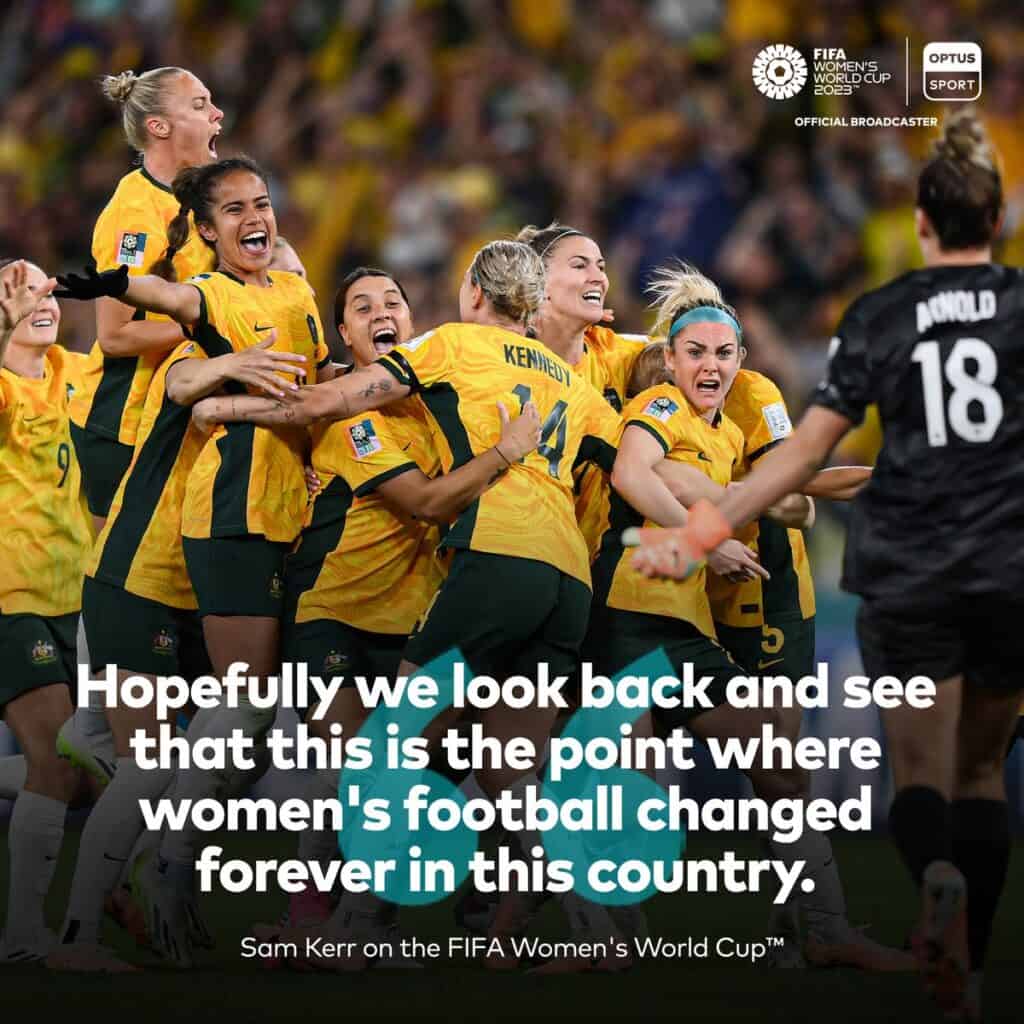
Clive Dickens stadium test
He’s a stickler for detail, Clive Dickens. He recently did a 5G test from Stadium Australia, with detail of how Optus Mobile performed against its competitors.
“The reason I did is because we’d made very big investment in all of the stadiums to make sure all of our customers had a fantastic experience. We thought there’s no way we can be sponsoring as Optus Sport and then broadcasting the Women’s World Cup matches if people go to the stadium and can’t get a signal.
“Typically, stadiums are the last thing in a 5G cycle that you would update because they’re actually empty for 80% of the time, versus suburbs, shopping centres and workplaces. We knew that there would be a lot of people. There were 346,000, Optus customers connected to our stadium cell sites across the 11 FIFA Australian venues during the tournament.”
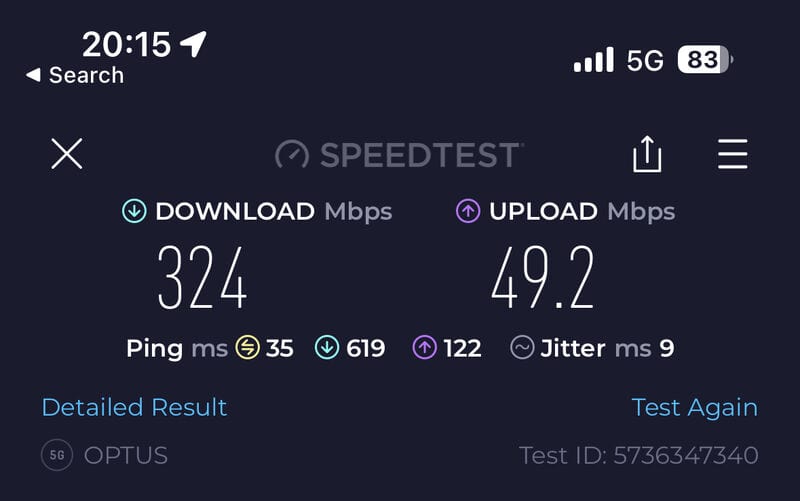
Dickens’ stadium speed test. Vodafone download was clocked at 25.5MBPS and Telstra at 64.0 MBPS
